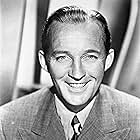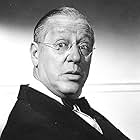After singing over the radio, Bing Crosby transmits a signal to elope to his sweeheart Helen; but her father is listening too. Undaunted, Bing tries, tries again.After singing over the radio, Bing Crosby transmits a signal to elope to his sweeheart Helen; but her father is listening too. Undaunted, Bing tries, tries again.After singing over the radio, Bing Crosby transmits a signal to elope to his sweeheart Helen; but her father is listening too. Undaunted, Bing tries, tries again.
Photos
Storyline
Did you know
- ConnectionsEdited into Down Memory Lane (1949)
Featured review
Mack Sennett's famous studio, a victim of the Depression and changing tastes in comedy, was forced to close its doors in the late summer of 1933. Most of the studio's best known silent clowns had already departed long before talkies came in, and for those who remained the new technology seemed more of a hindrance than a help to their fun-making. Mack didn't give up easily, however. In the year or so before his studio folded Sennett signed two performers of strikingly different styles to make short films: W.C. Fields and Bing Crosby. Fields' four Sennett shorts are highly regarded by comedy connoisseurs and still receive occasional screenings today, but it seems that Crosby's shorts for this studio have been largely forgotten. If you haven't seen them it's hard to imagine how Bing's wry humor and mellow musicality would fit the broad Sennett house style, but in the best of these films, such as Sing, Bing, Sing, it appears that the Sennett crew was willing to adapt to the cooler Crosby manner rather than compel Bing to adopt the studio's slapstick approach. (Something like this happened with Fields, too.) The series has its ups and downs, but in Sing, Bing, Sing the young leading man looks relaxed and chipper, and easily holds his own with the other players.
Perhaps it goes without saying that Bing sings a lot in this short. In the opening scene he's at a radio station crooning "My Hideaway" into one of those massive, boxy microphones of the day. When he concludes, we learn that he and his girlfriend Helen are planning to elope. We learn this, along with all of Bing's listeners, because he simply addresses her at home, where she's listening to his broadcast, and unfolds the plan. Unfortunately for the lovers Helen's crabby father is also listening. He wants to marry his daughter off to a callow young man named Herbert, played by the one and only Franklin Pangborn, so it's no wonder Helen is keen to run off with somebody else. Bing shows up that night at Helen's home to whisk her away but Dad and Herbert are waiting, along with two detectives in standard issue derby hats. But Bing is unflappable, and when the elopement is thwarted he simply tries again in the morning. The runaways are pursued over a mountain highway in a zany car chase, but Bing and Helen win out in the end—and Bing, naturally, has time for one more song.
That's really all the plot this breezy little short has to offer, which is fine. Story-wise this could have been a Sennett production of 1912. There are traditional slapstick bits involving a baseball bat, a bucket of water, etc., and for some crazy reason Helen's father owns a pet gorilla (?!?!?) named Charlie who plays a prominent role in the final chase, but the funniest moments in this short tend to be the verbal gags that are low-key and a bit saucy. It's worth mentioning that sound is used with more assurance than in the earlier Sennett talkies. Bing smoothly rattles off pun after pun and somehow they're amusing; he must have used this apprenticeship to prepare for the 'Road' series later on. And one of his songs is presented in a funny and imaginative way: when Bing sings "Between the Devil and the Deep Blue Sea" to Helen, he sings it to her on the phone while a cleaning lady stoically sweeps his room, forcing him to maneuver around her. He finally winds up on the table. (Trivia note for Beatles fans: George Harrison covered this song in 1991, and nicely, too.) It looks like the people responsible for Sing, Bing, Sing had themselves a good old time making it, and that sense of fun is still conveyed to viewers today.
Perhaps it goes without saying that Bing sings a lot in this short. In the opening scene he's at a radio station crooning "My Hideaway" into one of those massive, boxy microphones of the day. When he concludes, we learn that he and his girlfriend Helen are planning to elope. We learn this, along with all of Bing's listeners, because he simply addresses her at home, where she's listening to his broadcast, and unfolds the plan. Unfortunately for the lovers Helen's crabby father is also listening. He wants to marry his daughter off to a callow young man named Herbert, played by the one and only Franklin Pangborn, so it's no wonder Helen is keen to run off with somebody else. Bing shows up that night at Helen's home to whisk her away but Dad and Herbert are waiting, along with two detectives in standard issue derby hats. But Bing is unflappable, and when the elopement is thwarted he simply tries again in the morning. The runaways are pursued over a mountain highway in a zany car chase, but Bing and Helen win out in the end—and Bing, naturally, has time for one more song.
That's really all the plot this breezy little short has to offer, which is fine. Story-wise this could have been a Sennett production of 1912. There are traditional slapstick bits involving a baseball bat, a bucket of water, etc., and for some crazy reason Helen's father owns a pet gorilla (?!?!?) named Charlie who plays a prominent role in the final chase, but the funniest moments in this short tend to be the verbal gags that are low-key and a bit saucy. It's worth mentioning that sound is used with more assurance than in the earlier Sennett talkies. Bing smoothly rattles off pun after pun and somehow they're amusing; he must have used this apprenticeship to prepare for the 'Road' series later on. And one of his songs is presented in a funny and imaginative way: when Bing sings "Between the Devil and the Deep Blue Sea" to Helen, he sings it to her on the phone while a cleaning lady stoically sweeps his room, forcing him to maneuver around her. He finally winds up on the table. (Trivia note for Beatles fans: George Harrison covered this song in 1991, and nicely, too.) It looks like the people responsible for Sing, Bing, Sing had themselves a good old time making it, and that sense of fun is still conveyed to viewers today.
Details
- Release date
- Country of origin
- Language
- Also known as
- The Girl in the Transom
- Production company
- See more company credits at IMDbPro
- Runtime19 minutes
- Color
- Sound mix
- Aspect ratio
- 1.37 : 1
Contribute to this page
Suggest an edit or add missing content








